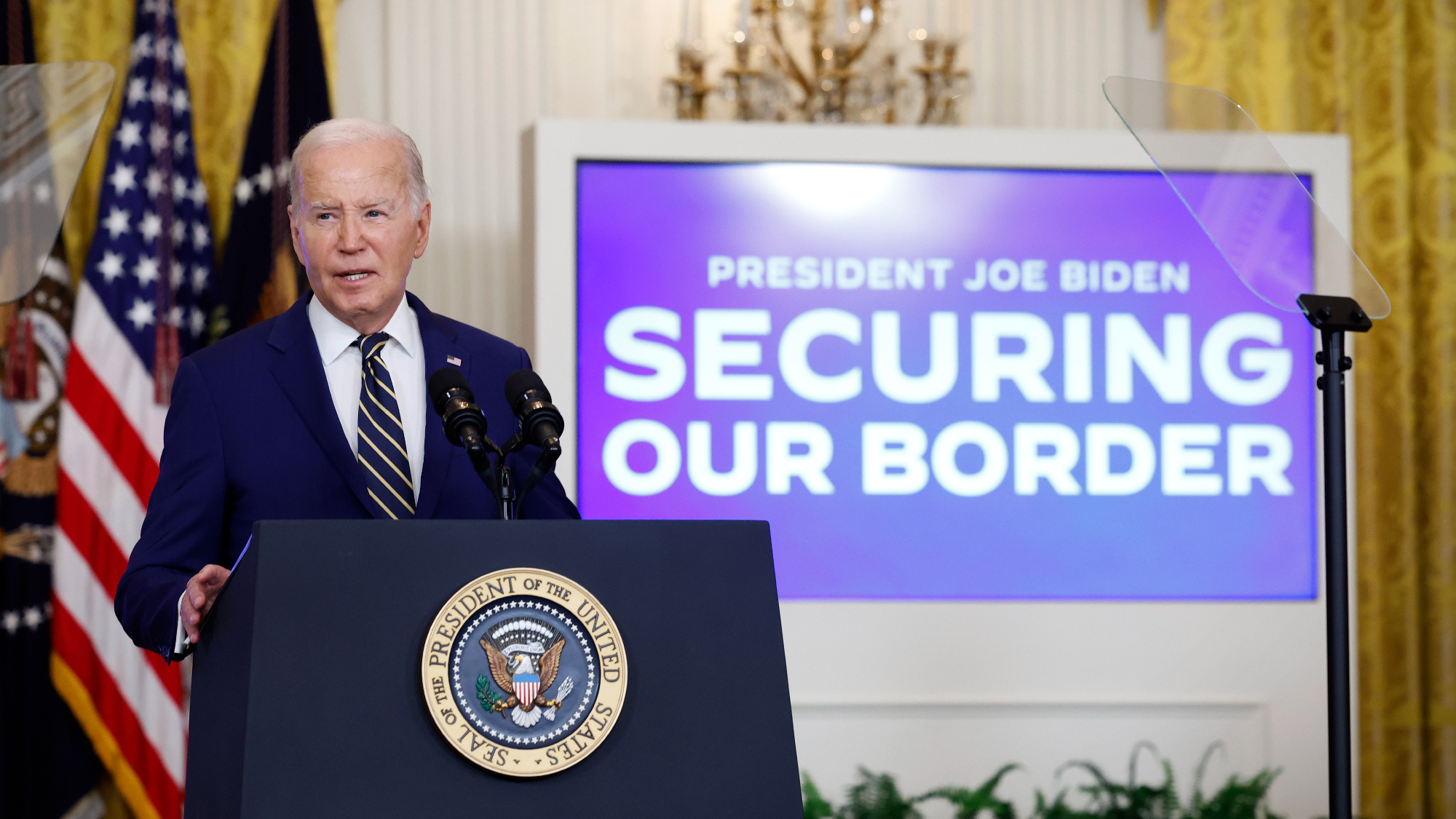Biden aims to limit asylum at US-Mexico border
The president instituted significant restrictions on migrants seeking asylum at the border


A free daily email with the biggest news stories of the day – and the best features from TheWeek.com
You are now subscribed
Your newsletter sign-up was successful
What happened
President Joe Biden on Tuesday issued an executive order to clamp down on asylum claims from migrants entering the U.S. across the southern border with Mexico.
Who said what
In order to preserve the U.S. as a "land that welcomes immigrants, we must first secure the border and secure it now," Biden said. It would be much better to "address this issue through bipartisan legislation," he added, but Republican lawmakers "left me with no choice." Biden's new order allows him to temporarily "suspend asylum claims in between ports of entry" when average migrant crossings surpass 2,500 per day over a seven-day period, Politico said. Since that threshold was met this week, the order took effect Wednesday. With certain exemptions, most undocumented migrants are to be repatriated.
It remains to be seen whether the new rules will have any "measurable impact on the border without an accompanying infusion of money from Congress to implement it," The Wall Street Journal said. Biden's proclamation is a "dramatic election-year move" and the "most restrictive border policy instituted" by any modern Democrat, The New York Times said. A similar 2018 effort by former President Donald Trump to cut off migration was "blocked in federal court."
What next?
The American Civil Liberties Union vowed to sue to block the measure. "An asylum ban was illegal under Trump and is just as illegal now," said ACLU lawyer Lee Gelernt to The Washington Post.
The Week
Escape your echo chamber. Get the facts behind the news, plus analysis from multiple perspectives.

Sign up for The Week's Free Newsletters
From our morning news briefing to a weekly Good News Newsletter, get the best of The Week delivered directly to your inbox.
From our morning news briefing to a weekly Good News Newsletter, get the best of The Week delivered directly to your inbox.
A free daily email with the biggest news stories of the day – and the best features from TheWeek.com
Rafi Schwartz has worked as a politics writer at The Week since 2022, where he covers elections, Congress and the White House. He was previously a contributing writer with Mic focusing largely on politics, a senior writer with Splinter News, a staff writer for Fusion's news lab, and the managing editor of Heeb Magazine, a Jewish life and culture publication. Rafi's work has appeared in Rolling Stone, GOOD and The Forward, among others.
-
 Switzerland could vote to cap its population
Switzerland could vote to cap its populationUnder the Radar Swiss People’s Party proposes referendum on radical anti-immigration measure to limit residents to 10 million
-
 Political cartoons for February 15
Political cartoons for February 15Cartoons Sunday's political cartoons include political ventriloquism, Europe in the middle, and more
-
 The broken water companies failing England and Wales
The broken water companies failing England and WalesExplainer With rising bills, deteriorating river health and a lack of investment, regulators face an uphill battle to stabilise the industry
-
 Trump links funding to name on Penn Station
Trump links funding to name on Penn StationSpeed Read Trump “can restart the funding with a snap of his fingers,” a Schumer insider said
-
 Trump reclassifies 50,000 federal jobs to ease firings
Trump reclassifies 50,000 federal jobs to ease firingsSpeed Read The rule strips longstanding job protections from federal workers
-
 Supreme Court upholds California gerrymander
Supreme Court upholds California gerrymanderSpeed Read The emergency docket order had no dissents from the court
-
 700 ICE agents exit Twin Cities amid legal chaos
700 ICE agents exit Twin Cities amid legal chaosSpeed Read More than 2,000 agents remain in the region
-
 Trump demands $1B from Harvard, deepening feud
Trump demands $1B from Harvard, deepening feudSpeed Read Trump has continually gone after the university during his second term
-
 House ends brief shutdown, tees up ICE showdown
House ends brief shutdown, tees up ICE showdownSpeed Read Numerous Democrats joined most Republicans in voting yes
-
 Trump’s Kennedy Center closure plan draws ire
Trump’s Kennedy Center closure plan draws ireSpeed Read Trump said he will close the center for two years for ‘renovations’
-
 Trump's ‘weaponization czar’ demoted at DOJ
Trump's ‘weaponization czar’ demoted at DOJSpeed Read Ed Martin lost his title as assistant attorney general
